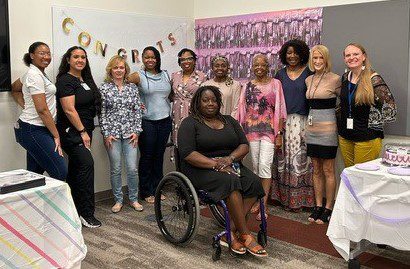How to Humanize your data: A Domestic Violence Survivors Guide

Data are an important part of the Charlotte-Mecklenburg ecosystem. When decisions hang in the balance regarding funding, policies, or programs, data can tip the scales. Conversations about data are frequently dominated by data scientists, professional service providers, executive administrators, and university researchers. But what of the people whom the data represent? Where are their voices in decisions about how their data are collected, stored, shared, and used? In October 2022, the Mecklenburg County Domestic Violence Research Collaborative (DVRC) launched to center domestic violence survivor voices in the conversation about what happens to domestic violence data locally.
The DVRC is a coalition of domestic violence survivors, advocates, researchers, and practitioners that came about to develop trauma-informed guidelines for conducting research; collecting, managing, and using sensitive domestic violence data; and collaborating with domestic violence survivors. Across 10 meetings, DVRC members co-created three sets of guidelines:
- Defining Domestic Violence
- Collecting Domestic Violence Data
- Obtaining Consent from Domestic Violence Survivors
Prominent themes are detailed in each of the guidelines and summarized below.
#1: Data represent people. This seems obvious but is challenging for both researchers and policymakers to practice. Getting lost in data findings and analysis occurs at the expense of understanding the experiences behind the data and can result in dehumanizing the people the data represent.
#2: People with lived experience of domestic violence need to be included as decision makers in all aspects of programming and policy. They also deserve to be equitably compensated for their input. Part of embodying the tenet that data represent people, is creating structures through which the people represented by the data can participate and make decisions about the programs and policies which will impact them.
#3: Survivors may define domestic violence differently than policymakers, professional service providers, researchers, and legal and social systems. Each entity using the term domestic violence should clarify its definition, attend to how the selected definition (un)intentionally excludes or includes certain people, and when possible, incorporate local survivors’ perspectives into the definition along with the services, programs, and policies the definition shapes (see #2).
#4: Survivors’ comfort with domestic violence data being collected, used, or shared shifts across time, experience, and context. Efforts to collect, use, and share data related to domestic violence should consider how survivors’ perspectives about data-sharing may evolve and be responsive to those shifts as part of data sharing processes.
To read more about these recommendations, please see the guidelines above developed and produced by the DVRC.
********
The authors would like to thank the DVRC Community Research Fellows and survivors who shared their time in building the guidelines: Melody Gross, Alceen Ford-Meggett, Alva Hailey, Monique Harris, Melanie Dunston, Linda Carr, Jeanne Muhammad, Juliana Lozano, Annemarie Seeley, Dr. Catherine Fuentes, Sydney Derr, Maria Zuluaga, Jess Sykes, and Bella Jarvis.
The authors also thank the Society for the Psychological Study of Social Issues Applied Social Issues Internship, the University of North Carolina at Charlotte Department of Psychological Science, and Mecklenburg County Community Support Services for providing funding and in-kind personnel to support this work.